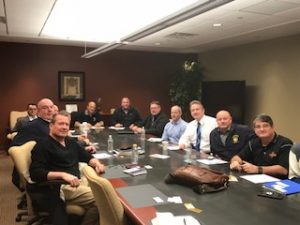
By Christine Myers, Region 2 Advocate
Oftentimes, people associate labor unions with big business, significant PACs, and tremendous governmental influence. But most trade unions are comprised of workers employed by small businesses, with local customers, and real concerns about the regulatory realities on their business. Recently, I met with representatives from 12 different trade unions to discuss how federal regulations were impacting their own businesses and other businesses in their respective unions. The roofers, pipe fitters, laborers, carpenters, plumbers, operating engineers and electrical workers each had their own story and opinions about how regulations affected their ability to get the job done.
When I opened the floor for discussion, one gentleman immediately groaned: “the Indiana Bat.”
“The Indiana bat?” I responded.
“But we live in New Jersey,” said another attendee.
“Exactly!” said the business owner.
He went on to explain that because this was an endangered species, this tiny, two-inch bat could halt construction for more than six months. Although the bat is indigenous to the Midwest, they do reside in the Northeast. If there is evidence of a bat within 10 miles of a construction site, certain trees cannot be cut down between April 1 and Nov. 15. November to March are the coldest months in New Jersey, and we typically get 3 feet of snow. Hard, cold ground covered with snow make digging a foundation extremely challenging. “It costs me thousands and thousands of dollars, and sometimes, it costs me the entire project,” the gentleman stated.
One turtle can really slow a project down, or even derail an entire project. Take, for example, another endangered animal, the Bog Turtle. “We don’t see any turtles until it’s time to start digging, it seems, and suddenly the Sierra Club shows up and finds a turtle,” one man told me. Saving endangered wildlife is clearly a priority, but it may cause the extension of a small business with insufficient resources to absorb 6-9 month project delays. There has to be a way to compromise.
L-1 workers are another area of concern. L-1 workers are guest workers allowed to be employed for specialty work that cannot be done with local resources. Typically this regulation is helpful to U.S.-based companies, as it gives them flexibility they need to hire the right resource. However, in this case, the gentleman explained that L-1 workers from Canada can be much less expensive than American workers, so companies blur the truth a bit to get approval to use foreign labor. In this case, the equipment was unique, but it didn’t require any special skill to use the equipment. This company was able to bring in Canadian resources, pay them much less (even if they housed them) and create an unfair advantage for their company. Fortunately, the issue was escalated to a U.S. senator who took corrective action.
Many of the attendees expressed concern over the lack of consistent inspections by the Department of Labor, the Occupational Safety and Health Administration, and U.S. Citizenship and Immigration Services on companies known to employ non-certified and/or unauthorized workers. “We know it’s happening, and everyone knows who employs unauthorized workers, but the regulations are not being enforced on the “big guys,” one attendee told stated.
A few attendees explained that small shops that employ authorized employees, performing tasks in which they have been certified often lose jobs to companies who don’t adhere to the regulations. One attendee said that it is not difficult for unauthorized workers to obtain false identification.
“It isn’t just about the money,” said another gentleman. All of those who attended felt that bad work ended up costing more money, and unsafe work could result in injury or someone’s life.
The participants agreed that some regulations are good, in fact essential, but if not consistently enforced, they are just as bad as having no regulations. They went on to say that other regulations are too over reaching and cause more problems than the problems they were designed to avoid. For all these reasons, small businesses need to have a voice in the regulatory process. Small Businesses are on the front lines where regulations meet real life. Although none of the attendees had heard of the Office of Advocacy, they left the meeting energized that now they can have a say in the never heard of the Office of Advocacy, regulatory process that affects their business and their livelihood.
For more information on the issues discussed in this blog, please see the following websites:
https://www.fws.gov/northeast/njfieldoffice/endangered/ibat.html
https://www.fws.gov/northeast/njfieldoffice/endangered/bogturtle.html
https://www.immihelp.com/l1-visa/l1-visa-h1b-visa-comparison.html
Christine Myers is the Office of Advocacy’s regional advocate representing New York, New Jersey, Puerto Rico and the U.S. Virgin Islands. Our Regional Advocates in the 10 SBA regions stand ready to hear from you about small business concerns and to help you level the playing field for small businesses in your state.
